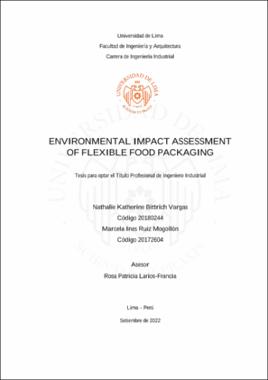Environmental Impact Assessment of Flexible Food Packaging

Ver/
Bittrich_Vargas-Ruiz_Mogollon .pdf
(application/pdf: 848.6Kb)
(application/pdf: 848.6Kb)
Fecha
2022Asesor(es)
Metadatos
Mostrar el registro completo del ítemResumen
“The impacts of environmental pollution are potentially irreversible and have become a major concern for society. Faced with this reality, the purpose of this research is to identify which type of flexible packaging material used in the food industry creates less pollution. The Leopold Matrix was applied to assess in quantitative terms the life cycle of plastic and paper packaging, using information from various scientific articles and peer-reviewed indexed journals. The interactions between physical, biological, and socioeconomic elements were established for each action in the life cycle of the packages. The results showed evidence that flexible plastic packaging pollutes 16% more in the physical aspect concerning soil and water pollution than paper packaging, which has a more significant impact on air pollution. Regarding the biological aspect, plastic pollutes 63% more than paper when it comes to the damage on the flora and fauna. Finally, moving to the socioeconomic aspect, paper poses a greater health risk for human beings due to the emission of gases in its production, whereas plastic packages contribute more to the economy for being an extensive industry.”
Cómo citar
Bittrich Vargas, N. K. & Ruiz Mogollón, M. I. (2022). Environmental Impact Assessment of Flexible Food Packaging [Tesis para optar el Título Profesional de Ingeniero Industrial, Universidad de Lima]. Repositorio institucional de la Universidad de Lima. https://hdl.handle.net/20.500.12724/16298Editor
Universidad de LimaColeccion(es)
- Tesis [1207]
El ítem tiene asociados los siguientes ficheros de licencia:

